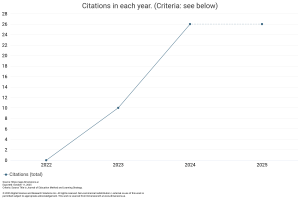Effectiveness Project Based Learning (PJBL) Model on Social Sciences Learning Outcomes in class IV of Gugus Ki Hajar Dewantara Bumi Raya District, Morowali Regency
DOI:
https://doi.org/10.59653/jemls.v2i02.811Keywords:
Effectiveness, Project Based Learning, Learning OutcomesAbstract
As it goes time, the curriculum in Indonesia has experience Lots development. The 2013 curriculum is curriculum newly designed based on paradigm education 21st century. Development curriculum the join in change load as well as the learning model used. A creative and prioritizing learning process experience personal (observing, asking, reasoning, and trying) is needed for support activity learning based 2013 curriculum. As for the formulation problems in research This Is the Project Based Learning (PJBL) learning model effective to results students studying social studies in class IV of the Ki Hajar Dewantara cluster Bumi Raya District, Regency Morowali, As for the objectives of the research .This for now effectiveness of the Project Based Learning (PJBL) model on results Study students in social studies learning in class IV of the Ki Hajar Dewantara cluster Bumi Raya District, Regency Morowali. The method used is Study quantitative can interpreted as method research based on philosophy positivism, used For research on populations or sample specific, data collection. Results Then you can concluded that effective use of the Project based learning model For increase results learn by eye social studies lessons in class 4 of the Ki Hajar Dewantara group Bumi Raya District, Morowali Regency. Temporary use method conventional No effective For increase results studying social studies in class IV of the Ki Hajar Dewantara cluster Bumi Raya District, Morowali Regency.
Downloads
References
Alqarny, FU, & Ridha, AR (2024). OBJECT OF EVALUATION OF LEARNING OUTCOMES COGNITIVE ASPECTS. 6.
Azurah, N., Musdansi, D. P., & Yuhelman, N. (2024). THE INFLUENCE OF THE SOMATIC AUDITORY VISUALIZATION INTELLECTUALY (SAVI) LEARNING MODEL ON LEARNING OUTCOMES OF CLASS XI SCIENCE STUDENTS ON COLLOID MATERIALS AT SMA NEGERI 1 BENAI. 4.
Farohah, N.A., & Tirtoni, F. (2024). THE INFLUENCE OF THE MULTICULTURALISM LEARNING MODEL ON THE PANCASILA EDUCATION MAPEL TO IMPROVE CRITICAL THINKING IN CLASS IV PRIMARY STUDENTS. Flobamorata Journal of Elementary Education, 5 (1), 165–173. https://doi.org/10.51494/jpdf.v5i1.1460
Hidayaturrohmah, N., Pancawati, N., Nugrahani, F., & Veronika, UP (2024). Learning model For Develop Skills Read Students in Class Low. Journal of Education, 33 (1), 485–496. https://doi.org/10.32585/jp.v33i1.4943
Key, K. (nd). Learning strategies Social Emotions in Prevention Bullying, Bullying in the Independent Curriculum.
Marwiah, S., Maharani, I., & Simamora, Y. (2024). The Influence of the Assisted Project Based Learning Model Application Mathway To Ability Literacy Numeracy MTs Darul Mukhlisin students. 06 (02).
Maryati, N., & Saputra, BA (2023). Innovative Strategy For Increase Culture Literacy with Learning Models Cooperative Types of TGT and Snakes and Ladders Media in the Material on Changes in Society during the Islamic Period at SMP Muhammadiyah 2 Taman Sidoarjo. TSAQOFAH, 4 (1), 173–180. https://doi.org/10.58578/tsaqofah.v4i1.2154
Moutawaqil, NE, & Wibawa, S. (2024). GAMPEL REYEK'S LEARNING MODEL (OBSERVE, LEARN, PRACTICE, REFLECT, AND PROJECT) IN A DIFFERENTIATION USING THE TPACK APPROACH TO PPKN LEARNING. 09.
Nolowala, EBU, Elizabeth, A., & Agung, B.H. (2024). Application of the Problem Based Learning Model with Content Contextual Learning For Increase Skills Think Criticism and Creativity Students on Static Fluid Materials. 06 (03).
Novitasari, D., & Asbari, M. (2021). Leaders Coaching in Schools : What His role on Teacher Performance? Edumaspul : Journal of Education, 5 (1), 580–597. https://doi.org/10.33487/edumaspul.v5i1.1299
Parifia, R., Khairan, MA, Amri, AR, & Ghanif, A. (nd). Improving Learning Results on Prayer Material Eclipse Use Learning Cooperative Type TeamGame Tournaments for Students School Intermediate First.
Rofif, AZ (nd). ANALYSIS OF THE INFLUENCE OF PROJECT BASED LEARNING MODELS ON BUILDING CONSTRUCTION COURSES.
Rosmini, H., Ningsih, N., Murni, M., & Adiyono, A. (2024). Transformation Leadership Head Schools in the Digital Era: Strategy Based Education Administration Technology in Schools Intermediate First.
Saibi, Y., Suryani, N., Novitri, SA, Hasan, D., & Anwar, VA (2020). Providing Patient Medication Information With Recipe Antibiotics and Antibiotic Preparation Without Prescriptions in South Tangerang: Providing Drug Information to Patients with Prescribing Antibiotics and Provision of Antibiotics without Prescription in South Tangerang. Galenika Journal of Pharmacy ( e -Journal), 6 (2). https://doi.org/10.22487/j24428744.2020.v6.i2.15051
Sari, M., & Nurmala, E. (2024). Application of Learning Models Problem Based for Increase Ability Think Critical to Learning Leadership ( Review Literature ). 1 (1).
Siti Muntamah, B., & Fardana N, NA (2024). GROWING CREATIVITY WITH LEARNING MODELS: LITERATURE REVIEW. Scholaria : Journal of Education and Culture, 14 (01), 46–58. https://doi.org/10.24246/j.js.2024.v14.i01.p46-58
Downloads
Published
How to Cite
Issue
Section
License
Copyright (c) 2024 Ni Kadek Suriastini, Hasan, Idrus

This work is licensed under a Creative Commons Attribution-ShareAlike 4.0 International License.
Authors who publish with this journal agree to the following terms:
- Authors retain copyright and grant the journal right of first publication with the work simultaneously licensed under a Creative Commons Attribution-ShareAlike that allows others to share the work with an acknowledgement of the work's authorship and initial publication in this journal.
- Authors are able to enter into separate, additional contractual arrangements for the non-exclusive distribution of the journal's published version of the work (e.g., post it to an institutional repository or publish it in a book), with an acknowledgement of its initial publication in this journal.
- Authors are permitted and encouraged to post their work online (e.g., in institutional repositories or on their website) prior to and during the submission process, as it can lead to productive exchanges, as well as earlier and greater citation of published work (See The Effect of Open Access).
























